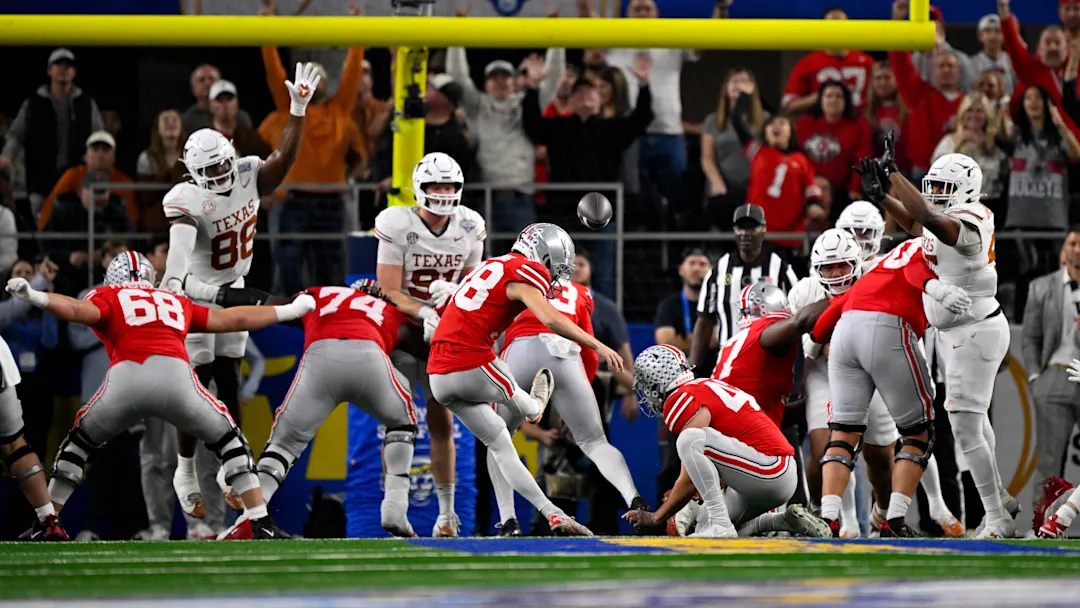In what’s quickly becoming one of the most unexpected off-field dramas of the college football offseason, a group of former Ohio State football players is threatening to boycott the Buckeyes’ upcoming high-profile matchup against the Texas Longhorns. Their reason? A contentious time slot decision by Fox that has stirred up frustration and sparked a broader conversation about player welfare, tradition, and television’s growing influence over the sport.
The much-anticipated showdown between Ohio State and Texas is set to take place on the second Saturday of the 2025 season. However, what was expected to be a marquee prime-time game has been slotted for Fox’s Big Noon Kickoff—an increasingly prominent, but polarizing, broadcast window that has drawn criticism from players and fans alike for its early start times.
According to multiple reports, the game is scheduled to kick off at 11 a.m. Central Time (12 p.m. Eastern), a move that has angered a number of Ohio State alumni who believe the early kickoff not only diminishes the spectacle of such a heavyweight clash, but also poses concerns for current athletes’ preparation, performance, and well-being. Leading the charge are former Buckeyes stars who have taken to social media, podcasts, and alumni forums to express their dissatisfaction, with some even threatening to boycott the game altogether if the decision isn’t reconsidered.
“This is one of the biggest non-conference games in the country,” former Ohio State quarterback Cardale Jones posted on X, formerly Twitter. “It deserves better than Big Noon. Give the players and fans what they deserve: a night game in a packed stadium under the lights. That’s college football.”
Jones’ sentiment has been echoed by numerous other Buckeye legends, including former linebacker Joshua Perry and wide receiver Ted Ginn Jr., both of whom voiced their displeasure with Fox’s decision. While none of them currently hold official roles with the university, their voices carry considerable weight within the Ohio State community and beyond.
Critics of the Big Noon Kickoff format argue that it forces teams—particularly those in the Central and Eastern time zones—to prepare for games much earlier than they’re accustomed to. Teams must adjust practice schedules, pregame routines, nutrition plans, and travel logistics, all of which can disrupt rhythm and increase the physical toll on athletes.
Moreover, for a game of this magnitude—a rare meeting between two of the sport’s most storied programs—many fans had expected a prime-time spectacle worthy of its billing. Instead, the noon kickoff risks muting the electric atmosphere that usually accompanies such contests. It also creates complications for fans who must travel long distances, often requiring early morning wake-ups or even overnight trips just to get to the stadium on time.
Former players aren’t the only ones speaking out. Many current Ohio State supporters have joined the chorus of frustration, voicing their opinions in fan forums, Reddit threads, and call-in radio shows. For many, the issue has become symbolic of a broader tension in college football: the tug-of-war between television networks and traditionalists who fear the soul of the sport is being lost to commercial interests.
Fox’s Big Noon Kickoff was introduced to counter ESPN’s dominance of the college football evening broadcast landscape. The network found success in boosting viewership by showcasing top-tier games in the early window, and the ratings have often justified the approach. But critics argue that what works from a television perspective doesn’t always align with what’s best for the athletes or the fan experience.
In a statement released earlier this week, a Fox spokesperson defended the time slot decision, citing consistent viewer interest in the Big Noon window and the network’s commitment to giving high-profile matchups the best exposure possible.
“We believe that Big Noon Kickoff offers a national stage for premier college football games,” the statement read. “The Ohio State vs. Texas matchup will receive top billing and be the centerpiece of our coverage that weekend.”
Still, that rationale has done little to quell the rising discontent. For many former players, it’s not just about ratings—it’s about respect.
“You can’t keep talking about player safety and mental health, and then turn around and schedule these grueling early kickoffs just to chase a few more TV dollars,” said Perry on a recent podcast appearance. “The hypocrisy is real.”
The controversy is not limited to Ohio State circles. Fans of Texas have also expressed disappointment with the scheduling, albeit with slightly less vocal intensity. For Longhorn supporters, the game represents a litmus test of their program’s resurgence under head coach Steve Sarkisian. A night game, many argue, would’ve brought a heightened sense of drama and intensity, making the environment at Darrell K Royal–Texas Memorial Stadium one of the most hostile and electric in the country.
There’s also the recruiting angle to consider. Prime-time games offer programs the opportunity to showcase their teams in a nationally televised spotlight, often in front of visiting recruits. Moving such a game to an earlier window arguably diminishes that impact.
While a full-fledged boycott by former players is unlikely to move the game from its current time slot, the protest is nonetheless a significant marker of growing unrest among stakeholders in the college football ecosystem. With the sport undergoing rapid changes—conference realignment, expanded playoffs, and the explosion of NIL opportunities—there is a pervasive sense that the foundational elements of college football are in flux.
This latest controversy has amplified calls for a more balanced approach to scheduling that considers both commercial viability and the needs of players, fans, and programs. Some have floated the idea of a player-alumni advisory board that could consult with networks and schools before major scheduling decisions are finalized.
Ohio State’s athletic department has yet to issue an official statement on the matter, though insiders suggest administrators are aware of the backlash and have communicated with Fox behind the scenes. Whether those conversations will yield any changes remains to be seen.
For now, the game remains slated for noon, and the tensions continue to simmer. What was once expected to be a celebration of elite college football now finds itself entangled in a narrative about corporate overreach, athlete welfare, and the ever-evolving identity of the sport.
Still, even amid the uproar, one thing is certain: when Ohio State and Texas finally take the field, millions will be watching—regardless of the kickoff time. Whether that attention will be enough to silence critics or simply add fuel to the fire is a question that may linger long after the final whistle.
As college football continues to evolve in the face of unprecedented change, the controversy surrounding the kickoff time of one marquee game may ultimately prove to be a harbinger of deeper conversations to come—about who truly holds power in the sport, and what vision will guide its future.



